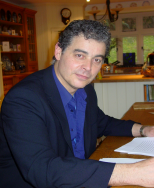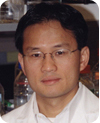Chairperson Xuetao Cao

Name: Xuetao Cao
Field: Immunology
Title: Professor
Academician of Chinese Academy of Engineering
Foreign Fellow of German Academy of Sciences
Foreign Fellow of French Academy of Medicine
Other Current Position:
President, Chinese Academy of Medical Sciences
President Peking Union Medical College
Director of the National Key Laboratory of Medical Immunology
Secretary General of Chinese Society for Immunology
Director of Institute of Immunology, Zhejiang University
Secretary General of of Federation of Immunological Societies in Asia and Oceania FIMSA
Professor Xuetao Cao is the current President of Chinese Academy of Medical Sciences and Peking Union Medical College. He was born in 1964 and received his both his MD and PhD degrees from the Second Military Medical University (1986 and 1990, Shanghai, China). He became Professor in Immunology in 1993 at the Second Military Medical University and the Director of the Institute of Immunology at the same University in 2001. He has also been Professor and Director of the National Key Laboratory of Medical Immunology since 2006. Professor Cao Xuetao was elected to the Chinese Academy of Engineering in 2005, German Academy of Sciences in 2013 and French Academy of Medicine in 2014. He was President of the Chinese Society for Immunology for eight years (2006-2014). He is currently the Secretary General of the Chinese Society for Immunology (2006), Secretary General of Federation of Immunological Societies in Asia and Oceania FIMSA (2012.-) and President of the Global Alliance for Chronic Diseases GACD (2013-2015).
His laboratory focuses on the understanding of innate signaling in immunity and inflammation, identification of cell subsets and new molecules in dendritic cell (DC)-initiated immune response and cancer immunotherapy. His group has identified important mediators and regulators of innate signaling, characterized immune subsets with regulatory function in immunity, inflammation and cancer. As corresponding author, he has published more than 220 original papers in prestigious peer-reviewed journals such as Cell, Science, Nature, Nature Immunology, Cancer Cell, and Immunity. He also serves on the editorial or advisory board of a number of international journals including Cell, Annual Reviews of Immunology, Science Translational Medicine and Gene Therapy.
Professor Xuetao Cao has won many awards in recognition of his scientific achievements and dedication to public services and China's medical research and education. He is widely recognized as a thought leader in promoting innovative and cross-disciplinary research at the national level and spearheads a number of initiatives. He is also proud to act as a bridge between China and the world on many occasions and has worked tirelessly to encourage international collaborations and enhance the global visibility of China's own research and development.
Members of SAB

Name:Oi Lin Irene NG
Title:Professor, Loke Yew Professor in Pathology
Field:Molecular pathology, hepatopathology and molecular oncology
Current Position:
Chair Professor of Pathology
Head of Department of Pathology of Hong Kong University
Director, State Key Laboratory for Liver Research (HKU)
Research Description:
Liver cancer - molecular genetics and cell signaling:
Molecular mechanisms in pathogenesis and metastasis
Delineation of important cell signaling pathways
Liver cancer stem cells
Tumor microenvironment
My research work focuses on the molecular basis in the formation and progression of liver cancer, identification and characterization of important genes, cell signaling pathways, and liver cancer stem cells. My laboratory looks into the major oncogenic signaling pathways in liver cancer and their co-operation and crosstalk. We are currently characterizing critical oncogenic signaling pathways in liver cancer, including DLC1/Rho/ROCK, Wnt/b-catenin, and PTEN/Akt/mTOR, and investigating the cooperation and crosstalk of these pathways with other critical genes and pathways. We are also investigating the molecular mechanisms leading to liver cancer metastasis. We aim to identify the key molecules that govern cell motility and invasion of cancer cells and the tumor microenvironment that enhances metastasis. We are using next generation sequencing to look for novel liver cancer-related genes involved in the disease's development, biological mechanism and metastasis.
Members of SAB

Name:Peter Parker
Field:Cancer Cell Biology
Title:Professor,Fellowship of the Royal Society
Fellow of the Academy of Medical Sciences
Member of European Molecular Biology Organization
Other Current Position:
Deputy Director of the Integrated Cancer Centre (ICC)
Head of the Division of Cancer Studies at King's College London
Co-director of the King’s College London Experimental Cancer Medicine Centre
Research of Interest:Signal transduction pathways, their functional status, prognostic and therapeutic potential in cancer
Professor Peter Parker is Deputy Director of the Integrated Cancer Centre (ICC), Head of the Division of Cancer Studies at King's College London and co-director of the King’s College London Experimental Cancer Medicine Centre.Professor Parker is also a Principal Scientist at the London Research Institute of Cancer Research UK.
Peter was elected to the Fellowship of the Royal Society in 2006 for his major contribution to the understanding of the enzymology of signal transduction cascades which links changes in external events to alterations in cellular behaviour. He is also a Fellow of the Academy of Medical Sciences and a member of EMBO.
Members of SAB

Name:Peter Schmid
Title:Professor
Field:Breast and Lung Cancer and Early Drug Development
Current Position:
Lead of the Centre of Experimental Cancer Medicine at Barts
Lead of the joint Barts/Brighton Experimental Cancer Medicine Centre
Leading the academic breast and lung cancer programmes at Barts
Research Interest:
Professor Peter Schmid was appointed as Chair in Cancer Medicine at Barts Cancer Institute in 2013. He is Lead of the Centre of Experimental Cancer Medicine at Barts and of the joint Barts/Brighton Experimental Cancer Medicine Centre. He also leads the academic breast and lung cancer programmes at Barts.
Professor Schmid’s specialist cancer interests are breast and lung cancer and early drug development. His research interests lie in stratified cancer medicine utilising novel biomarkers and innovative, biomarker-driven clinical trial strategies to develop new treatments. His group focuses on new therapeutic targets exploiting synthetic sensitivity interactions based on specific epigenetic backgrounds. Professor Schmid has successfully led ≥20 academic clinical phase 1-3 studies and several translational research programmes. He leads an international group to establish circulating tumour DNA (cfDNA) as a biomarker.
Professor Schmid is a member of several international cancer organizations and research groups and has been involved in consensus meetings on the management of breast cancer. Professor Schmid is a member of the UK NCRN breast cancer group.
Members of SAB

Name: Duanqing Pei
Field: Stem Cell Biology
Title: Professor, National‘863 Plan’ Expert in Biomedicine,
Expert in National Medium and Long Term Science and Technology Development Plan
Expert in ‘Reproduction and Growth’,
Distinguished Young Scholar of China Scholarship Council
Present Position:
President, Guangzhou Institute of Biomedicine and Health, Chinese Academy of Sciences
Editorial Board member, Journal of Biological Chemistry
Vice Editor–in-Chief, Cell Research
Executive Board Member, Asia-Pacific Stem CellNetwork
Chair of Committee, Guangzhou Stem Cell and Regenerative MedicineTechnology Alliance
Research Description:
Duanqing Pei is a Professor of Stem Cell Biology and also serves as the Director-General (President) at the Guangzhou Institutes of Biomedicine and Health (GIBH), Chinese Academy of Sciences, in Guangzhou, China. He obtained his PhD from the University of Pennsylvania in 1991 and trained as a postdoctoral fellow at the University of Michigan before becoming a faculty member at the University of Minnesota, School of Medicine in 1996. He joined the Medical Faculty at Tsinghua University in Beijing China in 2002 and moved to the newly formed GIBH in 2004.
Professor Duanqing Pei studied the transcription regulation of hepatitis B virus (HBV) for his Ph.D. thesis by identifying C/EBP as a repressor for HBV transcription and dissecting the transactivation domains in C/EBP. Then he shifted his research interest into the field of extracellular matrix remodeling by studying the structure and function of matrix metalloproteinases (MMPs). He cloned several novel members of the MMP family, uncovered the unique intracellular activation mechanism of MMPs with the proprotein convertase system, and the intracellular trafficking of membrane-bound MMPs. Upon returning to China, he once again changed his field of study and started working on pluripotency first and then reprogramming. Professor Duanqing Pei’s lab in Tsinghua began to publish in the stem cell field on the structure and function of Oct4, Sox2, FoxD3, Essrb, and Nanog, and their interdependent relationship towards pluripotency. Based the understanding of these factors, the Pei lab was the first in China to create mouse iPSCs using a non-selective system, and then improved the iPS process systematically. The Pei lab subsequently disseminated the iPS technology in China by providing not only resources, but also training workshops. Recent publications from Professor Duanqing Pei’s lab includes the discovery of vitamin C as a potent booster for iPSC generation and a mesenchymal to epithelial transition initiates the reprogramming process of mouse fibroblasts. Now, his lab continues to explore new ways to improve iPS technology, dissect the reprogramming mechanisms driven by Oct4/Sox2/Klf4 or fewer factors, and employ iPSCs to model human diseases in vitro.